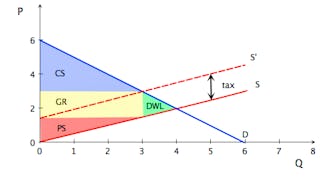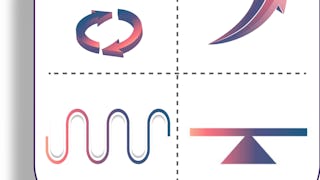Kritisches Nachdenken über die heutige Wirtschaft kann Ihnen helfen, die Welt um Sie herum zu verstehen. Wirtschaft: Gesellschaft, Märkte und [Un-]Gleichheit wird Ihre Neugierde wecken und Sie dazu inspirieren, mehr über die Machtdynamik zu erfahren, die bestimmt, wie Menschen und Ressourcen bewertet werden, wie Waren um die Welt gehen und wie wir unseren Planeten und die Zukunft verwalten. Ihr Verständnis von Wirtschaft wird Sie zu einem besseren Fürsprecher, Wähler, Investor, Verbraucher und Bürger machen. Sie werden auch ein Verständnis für die Vor- und Nachteile unseres derzeitigen Wirtschaftssystems entwickeln und einen Denkrahmen dafür erhalten, wie wir als Individuen und als Gesellschaft unsere Beziehung zu unserem Planeten und die Art und Weise, wie wir miteinander umgehen, neu überdenken können.


Wirtschaft: Gesellschaft, Märkte und [Un]gleichheit



Dozenten: Teresa Ghilarducci
2.918 bereits angemeldet
(40 Bewertungen)
Empfohlene Erfahrung
Was Sie lernen werden
Entwickeln Sie eine ökonomische Weltsicht zu Fragen der sozialen und planetarischen Resilienz.
Kommunizieren und diskutieren Sie reale wirtschaftliche Themen, ihren historischen Kontext und wie sie unsere Gesellschaft heute beeinflussen.
Setzen Sie Ihr neues Verständnis von Kapitalismus und Märkten in die Tat um, indem Sie einen kritischen Blick auf die Welt um Sie herum werfen.
Wichtige Details
4 Aufgaben
Erfahren Sie, wie Mitarbeiter führender Unternehmen gefragte Kompetenzen erwerben.

In diesem Kurs gibt es 5 Module
Willkommen zu Woche 1 von Wirtschaft: Gesellschaft, Märkte und [Un]gleichheit. In dieser Woche geht es darum, wie die wirtschaftliche Analyse uns helfen kann, die Welt um uns herum und unsere Geschichte zu verstehen. Diese Reihe von Lektionen beginnt mit einem Überblick über den modernen Kapitalismus und seine Entwicklung und beschäftigt sich dann mit den Gewinnen und wie sie die Wirtschaft antreiben. Schließlich erfahren Sie, wie verschiedene Wirtschaftsphilosophien, die wir für selbstverständlich halten, die Art und Weise beeinflussen, wie wir die Welt sehen, insbesondere wie wir Reichtum und Armut sehen. Sie werden erfahren, wie diese Philosophien entstanden sind, und vielleicht werden Sie sogar herausgefordert, Ihr eigenes Weltbild zu überdenken. Also, lassen Sie uns anfangen!
Das ist alles enthalten
4 Videos3 Lektüren1 Aufgabe4 Diskussionsthemen
Willkommen zu Woche 2 von Wirtschaft: Gesellschaft, Märkte und [Un]gleichheit. Die Lektionen in diesem Modul befassen sich mit der komplexen Beziehung zwischen individuellen Handlungen und sozialen Ergebnissen in kapitalistischen Volkswirtschaften. Sie werden das Gute, das Schlechte und das Hässliche in der Funktionsweise dieser Volkswirtschaften kennenlernen: wie wettbewerbsfähige Märkte uns gute soziale Ergebnisse bescheren können, wie Entscheidungen, die vom Streben nach individuellem Profit getrieben werden, die Wirtschaft als Ganzes potenziell destabilisieren können und wie der Kapitalismus so verstanden werden kann, dass er bestimmte soziale Gruppen ausnutzt. Also, lassen Sie uns anfangen!
Das ist alles enthalten
13 Videos3 Lektüren1 Aufgabe4 Diskussionsthemen
Willkommen zu Woche 3 von Wirtschaft: Gesellschaft, Märkte und [Un]gleichheit. Diese Woche behandelt das Thema Macht am Arbeitsplatz und bezieht sich durchgehend auf das Konzept des Reservationslohns. Im Laufe der Lektionen erfahren Sie, was die Verhandlungsmacht der Arbeitnehmer einschränkt und was sie stärkt. Schließlich werden Sie im Laufe der Woche auch etwas über Schlüsselmomente in der Geschichte erfahren, die Einfluss darauf hatten, inwieweit Arbeitnehmer in der Lage sind, die Sicherheit zu erlangen, die sie brauchen. Die Rolle von Regierung und Gewerkschaften wird in diesem Zusammenhang ebenso erörtert wie der Einfluss von Marktstrukturen. Also, fangen wir an!
Das ist alles enthalten
8 Videos5 Lektüren1 Aufgabe5 Diskussionsthemen
Willkommen zu Woche 4 von Wirtschaft: Gesellschaft, Märkte und [Un]gleichheit. In den Lektionen dieser Woche werden die Fragen gestellt: Was ist wirtschaftliche Globalisierung? Wann ist sie entstanden? Welche Folgen hat sie für die Menschen und ihr Wohlergehen? Warum eine weltliche Philosophie? Diese Lektionsreihe erforscht das Wesen und das Ausmaß der Globalisierung und wie sich die Gesellschaft von isolierten Märkten zu einem vernetzten Wirtschaftssystem entwickelt hat. Sie erfahren, welche Kräfte die Globalisierung vorantreiben, warum und wie Unternehmen in globalen Wertschöpfungsketten Teile und Arbeitskräfte aus anderen Ländern einkaufen und wie die Globalisierung der Gesellschaft nützt. Außerdem erfahren Sie etwas über die Nachteile der Globalisierung - die Gewinner und die Verlierer - und darüber, wie wir die Weltwirtschaft überdenken können, damit sie für eine breitere Schicht der Gesellschaft und eine größere Anzahl von Ländern besser funktioniert. Lassen Sie uns also in die Lektionen eintauchen und Ihren Geist für die Möglichkeiten öffnen!
Das ist alles enthalten
9 Videos4 Lektüren1 Aufgabe4 Diskussionsthemen
Willkommen zu Woche 5 von Wirtschaft: Gesellschaft, Märkte und [Un]gleichheit. Diese Woche bildet den Höhepunkt der vorangegangenen Lektionen und bietet die Gelegenheit, darüber nachzudenken, welche entscheidenden Veränderungen vorgenommen werden müssen. Wenn Sie diese Woche Revue passieren lassen, nehmen Sie sich die Zeit, darüber nachzudenken, welche Rolle Sie bei der Gestaltung einer besseren Wirtschaft spielen können, damit die Menschen und der Planet gedeihen können. Also, lassen Sie uns anfangen!
Das ist alles enthalten
2 Videos2 Lektüren1 peer review2 Diskussionsthemen
Dozenten


Empfohlen, wenn Sie sich für Wirtschaft interessieren

University of Pennsylvania

Erasmus University Rotterdam

Rice University

University of Illinois Urbana-Champaign
Warum entscheiden sich Menschen für Coursera für ihre Karriere?





Neue Karrieremöglichkeiten mit Coursera Plus
Unbegrenzter Zugang zu 10,000+ Weltklasse-Kursen, praktischen Projekten und berufsqualifizierenden Zertifikatsprogrammen - alles in Ihrem Abonnement enthalten
Bringen Sie Ihre Karriere mit einem Online-Abschluss voran.
Erwerben Sie einen Abschluss von erstklassigen Universitäten – 100 % online
Schließen Sie sich mehr als 3.400 Unternehmen in aller Welt an, die sich für Coursera for Business entschieden haben.
Schulen Sie Ihre Mitarbeiter*innen, um sich in der digitalen Wirtschaft zu behaupten.
Häufig gestellte Fragen
Der Zugang zu Vorlesungen und Aufgaben hängt von der Art Ihrer Einschreibung ab. Wenn Sie einen Kurs im Prüfungsmodus belegen, können Sie die meisten Kursmaterialien kostenlos einsehen. Um auf benotete Aufgaben zuzugreifen und ein Zertifikat zu erwerben, müssen Sie die Zertifikatserfahrung während oder nach Ihrer Prüfung erwerben. Wenn Sie die Prüfungsoption nicht sehen:
Der Kurs bietet möglicherweise keine Prüfungsoption. Sie können stattdessen eine kostenlose Testversion ausprobieren oder finanzielle Unterstützung beantragen.
Der Kurs bietet möglicherweise stattdessen die Option 'Vollständiger Kurs, kein Zertifikat'. Mit dieser Option können Sie alle Kursmaterialien einsehen, die erforderlichen Bewertungen abgeben und eine Abschlussnote erhalten. Dies bedeutet auch, dass Sie kein Zertifikat erwerben können.